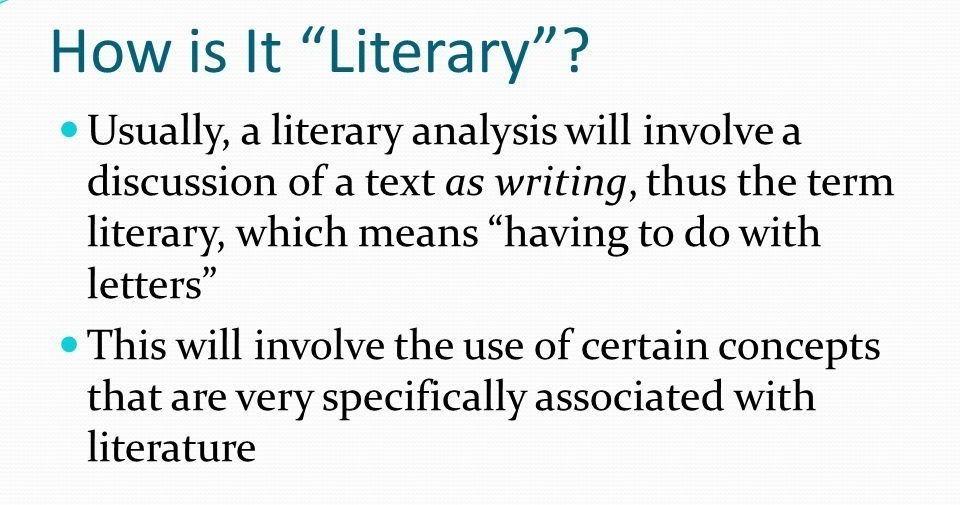
If you are inexperienced with writing academic papers, chances are you are asking yourself, "What is a literary analysis?" The reason why so many students ask, "What does literary analysis mean" is because it sounds so complicated when, in reality, it is far less technical than you might imagine. But unless academia settles on a better term, students will continue to ask, " What is an analysis of literature?" and be intimidated by the thought. Ultimately, analysis of literature involves examining a text closely so that you can explain what it means on a deeper level. This requires you to focus on the nuances and subtleties of the work, even when it is to speculate the author's intention when it is not already clear.
Of course, reading literature carefully is often difficult to qualify. But there are certain ways in which you can achieve this. For instance, examine all of the elements of a story such as exposition, rising action, climax and conclusion. Think about how the author brings all of these elements together in order to create a satisfying coherent narrative. What makes analysis important is that it allows you to develop an appreciation for literature far beyond understanding it on face value. Indeed, it is often fun to try to imagine what the author was thinking as they developed the characters and the story plots. Still asking yourself, "What is literary analysis?" Then read further.
Literary Analysis Definition
A literary analysis definition is a subjective interpretation of an essay that involves expressing an opinion. In that sense, this makes it different from most essays in which you are expected to present your findings in an objective manner. Now that we have managed to define "analyze," when you define "point of view," think of it as your own interpretation of the work based on evidence found in the literature itself. You can also define elements such as plot, theme, character and tone, define tone in literature (referring to the writer's attitude toward the subject or audience), define theme in literature (the central topic of the story), define symbolism in literature (using one thing to represent something else), define literary devices (such as imagery, foreshadowing, and metaphors), and define allegory in literature (a story that reveals a hidden message).
What Is Lit Analysis?
Simple stated, a lit analysis is your opinion expressed through an essay. However, keep in mind that an opinion is only as good as the evidence that you present. In other words, as you discuss what you believe to be the author's intentions, you will need to back it up by pointing out parts of the text that lead you to speculate. However, even though you are expressing an opinion you should avoid referring to yourself in the first person (I, me). Also note that as you are thinking of a title for the essay, do not simply call it "An Analysis of Grapes of Wrath." Make reference to the specific elements of the story that you intend to focus on. Use present tense when recounting the events of the story and come up with a thesis statement that your entire paper is built around.
What Lit Analysis Is not
Be aware the purpose of a literary analysis is not to merely summarize the story. In fact, you should assume that the audience already has an understanding of the literature being analyzed. A summary objectively discusses the actual story without adding any observations or personal insight. But an analysis goes far beyond this. For instance, when discussing a literary element such as situational irony, discuss why you believe the author chose this technique in order to move the plot forward.
Why Write Literary Analysis Essays?
A lot of people enjoy reading books at face value, and while there is nothing wrong with that, a story can become far more enjoyable if you dig deeper into all of the elements. Dissect the story, look at the individual parts and ask yourself, "How do these various choices that the author makes advance the story?" This will make you a far better reader and, if you aspire to write, it can even improve your writing skills.
Close Reading
When you take a literature class in high school or college, your instructor will often ask you to engage in close reading. This entails a deep analysis of how the story comes together. It involves the topics and themes, the form, and even the word choices that the author utilizes. By looking at the various elements, we can develop a better understanding of the literature as a whole. One good example is to consider stories that are narrated by the characters themselves. Since they are only able to perceive things through incomplete knowledge, the reader is essentially in the know in ways that the characters aren't, and this can often make the reader feel sympathetic when the character makes a poor decision that seals their fate.
If you are engaging in close reading properly, you should be able to generate plenty of questions that will make for interest discussions in class. Of course, close reading is also the perfect way to get your literary analysis essay started! While on the surface, it might appear that close reading would lead to over-analyzing; the reality is that the process works itself out in the end. For example, you might propose an argument, but once you think about it more, you begin to realize that it is probably not supported by the facts. On the other hand, you might uncover some hidden clues or foreshadowing that really do make for compelling arguments! Either way, close reading allows you to incorporate your own imagination into the author's own work, and that really enhance your enjoyment of it.

